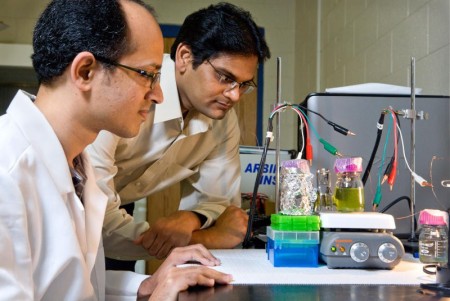May
13
Solar Electricity by Plant Photosynthesis
May 13, 2013 | Leave a Comment
Ramaraja Ramasamy, assistant professor in the University of Georgia (UGA) College of Engineering said, “We have developed a way to interrupt photosynthesis so that we can capture the electrons before the plant uses them to make sugars.” Ramasamy is also a member of UGA’s Nanoscale Science and Engineering Center.
The sun is the largest source of energy on the planet. However, only a tiny fraction of the solar radiation on Earth is converted into useful energy. The UGA researchers looked to nature for inspiration, and they are now developing a new technology that makes it possible to use plants to generate electricity directly.
During photosynthesis, plants use sunlight to split water atoms into hydrogen and oxygen, which produces electrons. These newly freed electrons go on to help create sugars that plants use much like food to support growth and reproduction.
Ramasamy’s technology involves separating out structures in the plant cell called thylakoids, which are responsible for capturing and storing energy from sunlight. Researchers manipulate the proteins contained in the thylakoids, interrupting the pathway along which electrons flow.
Then the modified thylakoids are immobilized on a specially designed backing of carbon nanotubes, cylindrical structures that are nearly 50,000 times finer than a human hair. The nanotubes act as an electrical conductor, capturing the electrons from the plant material and sending them along a wire.
In small-scale experiments, this approach resulted in electrical current levels that are two orders of magnitude larger than those previously reported in similar systems.
Plants are the undisputed champions of solar power. After billions of years of evolution, most of them operate at nearly 100% quantum efficiency, meaning that for every photon of sunlight a plant captures, it produces an equal number of electrons. Converting even a fraction of this into electricity would improve upon the efficiency seen with solar panels, which generally operate at efficiency levels between 10 and 20 percent.
Ramasamy said, “This approach may one day transform our ability to generate cleaner power from sunlight using plant-based systems.”
Ramasamy cautions that much more work must be done before this technology reaches commercialization, but he and his collaborators are already working to improve the stability and output of their device.
“In the near term, this technology might best be used for remote sensors or other portable electronic equipment that requires less power to run,” he said. “If we are able to leverage technologies like genetic engineering to enhance stability of the plant photosynthetic machineries, I’m very hopeful that this technology will be competitive to traditional solar panels in the future.”
“We have discovered something very promising here, and it is certainly worth exploring further,” he said. “The electrical output we see now is modest, but only about 30 years ago, hydrogen fuel cells were in their infancy, and now they can power cars, buses and even buildings.”
The study paper was co-authored by UGA graduate student Jessica Calkins and postdoctoral research associate Yogeswaran Umasankar.
It’s quite a scientific leap to developing bio-electrodes based on immobilized plant cell structures to harvest light energy. Such electrodes used in photosynthetic electrochemical cells that convert direct into electricity with no external fuel would be revolutionary.
Ramasamy is right at the leading edge of research carving a new potential path for solar harvesting. One hundred percent efficiency is the potential and the plant based science looks like it could get very close to harvesting it all.
Stay on target there at UGA – the potential is huge and the challenges immense.


